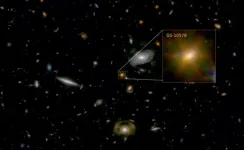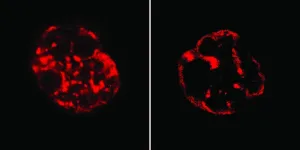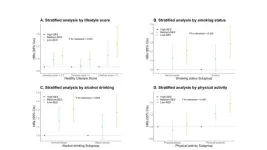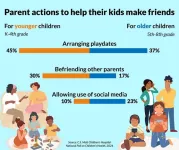(Press-News.org) Astronomers have used the NASA/ESA James Webb Space Telescope to confirm that supermassive black holes can starve their host galaxies of the fuel they need to form new stars.
The international team, co-led by the University of Cambridge, used Webb to observe a galaxy roughly the size of the Milky Way in the early universe, about two billion years after the Big Bang. Like most large galaxies, it has a supermassive black hole at its centre. However, this galaxy is essentially ‘dead’: it has mostly stopped forming new stars.
“Based on earlier observations, we knew this galaxy was in a quenched state: it’s not forming many stars given its size, and we expect there is a link between the black hole and the end of star formation,” said co-lead author Dr Francesco D’Eugenio from Cambridge’s Kavli Institute for Cosmology. “However, until Webb, we haven’t been able to study this galaxy in enough detail to confirm that link, and we haven’t known whether this quenched state is temporary or permanent.”
This galaxy, officially named GS-10578 but nicknamed ‘Pablo’s Galaxy’ after the colleague who decided to observe it in detail, is massive for such an early period in the universe: its total mass is about 200 billion times the mass of our Sun, and most of its stars formed between 12.5 and 11.5 billion years ago.
“In the early universe, most galaxies are forming lots of stars, so it’s interesting to see such a massive dead galaxy at this period in time,” said co-author Professor Roberto Maiolino, also from the Kavli Institute for Cosmology. “If it had enough time to get to this massive size, whatever process that stopped star formation likely happened relatively quickly.”
Using Webb, the researchers detected that this galaxy is expelling large amounts of gas at speeds of about 1,000 kilometres per second, which is fast enough to escape the galaxy’s gravitational pull. These fast-moving winds are being ‘pushed’ out of the galaxy by the black hole.
Like other galaxies with accreting black holes, ‘Pablo’s Galaxy’ has fast outflowing winds of hot gas, but these gas clouds are tenuous and have little mass. Webb detected the presence of a new wind component, which could not be seen with earlier telescopes. This gas is colder, which means it’s denser and – crucially – does not emit any light. Webb, with its superior sensitivity, can see these dark gas clouds because they block some of the light from the galaxy behind them.
The mass of gas being ejected from the galaxy is greater than what the galaxy would require to keep forming new stars. In essence, the black hole is starving the galaxy to death. The results are reported in the journal Nature Astronomy.
“We found the culprit,” said D’Eugenio. “The black hole is killing this galaxy and keeping it dormant, by cutting off the source of ‘food’ the galaxy needs to form new stars.”
Although earlier theoretical models had predicted that black holes had this effect on galaxies, before Webb, it had not been possible to detect this effect directly.
Earlier models had predicted that the end of star formation has a violent, turbulent effect on galaxies, destroying their shape in the process. But the stars in this disc-shaped galaxy are still moving in an orderly way, suggesting that this is not always the case.
“We knew that black holes have a massive impact on galaxies, and perhaps it’s common that they stop star formation, but until Webb, we weren’t able to directly confirm this,” said Maiolino. “It’s yet another way that Webb is such a giant leap forward in terms of our ability to study the early universe and how it evolved.”
New observations with the Atacama Large Millimeter-Submillimiter Array (ALMA), targeting the coldest, darkest gas components of the galaxy, will tell us more about if and where any fuel for star formation is still hidden in this galaxy, and what is the effect of the supermassive black hole in the region surrounding the galaxy.
The research was supported in part by the Royal Society, the European Union, the European Research Council, and the Science and Technology Facilities Council (STFC), part of UK Research and Innovation (UKRI).
END
Astronomers detect black hole ‘starving’ its host galaxy to death
2024-09-16
ELSE PRESS RELEASES FROM THIS DATE:
Is CREME AI’s answer to CRISPR?
2024-09-16
Imagine you’re looking at millions upon millions of mysterious genetic mutations. With CRISPR gene-editing technology, a select few of these mutations might have therapeutic potential. However, proving it would mean many thousands of hours of lab work. Just figuring out which ones are worth exploring further would take a lot of time and money. But what if you could do it in the virtual realm with artificial intelligence?
CREME is a new AI-powered virtual laboratory invented by Cold Spring Harbor Laboratory (CSHL) Assistant Professor Peter Koo and his team. It allows geneticists to run thousands of virtual experiments ...
Interrelated social factors may affect cardiovascular health in Asian American subgroups
2024-09-16
Statement Highlights:
There are a variety of interrelated social and structural factors that contribute to differences in cardiovascular health among Asian Americans, and these factors are likely different within individual Asian ethnic subgroups.
Asian Americans and Asian immigrants are quite diverse and comprise many ethnic groups.
Social determinants, such as immigration-related factors, discrimination, socioeconomic status, English proficiency and cultural beliefs, may influence health behaviors, access to health care and the ability ...
New insights into DNA organization during embryonic development
2024-09-16
Researchers from the Kind Group have gained new insights into the mechanism behind the spatial organization of DNA within the cells of early embryos. When an embryo is first formed after fertilization, each cell has the potential to become any cell type of the body. The researchers have studied the spatial organization of DNA that is so particular to these early developmental stages. The paper was published in Nature Genetics on September 16th, 2024.
Every cell in our body contains the same DNA. ...
Socioeconomic inequality linked to increased risk of age-related macular degeneration
2024-09-16
A recent study conducted by researchers from Shanghai Jiao Tong University School of Medicine and Fudan University has revealed a significant association between socioeconomic status (SES) inequality and the risk of developing age-related macular degeneration (AMD). Published in Health Data Science, the study highlights how a healthy lifestyle can mitigate some of the risks associated with low SES.
Socioeconomic disparities have long been a concern in various health outcomes. This study, led ...
Cow slime can help disc herniation patients after surgery
2024-09-16
Researchers at Uppsala University have developed a gel inspired by cow slime for patients suffering from disc herniation. By adding the mucin gel immediately after surgery, it is possible to create a protective barrier around the discs to prevent the immune system from attacking their nucleus pulposus. This keeps the discs intact and reduces the risk of further damage.
“This new approach offers hope for those suffering from back pain caused by disc herniation and may prevent further damage after removing ...
1 in 5 parents worry their elementary and middle school aged kids don’t have friends
2024-09-16
ANN ARBOR, Mich. – Developing friendships is often seen as a natural part of childhood but it may be easier for some kids than others.
And many parents worry about their children’s friendships, according to the University of Michigan Health C.S. Mott Children’s Hospital National Poll on Children’s Health, with one in five saying their child ages six to 12 has no friends or not enough friends.
Ninety percent of parents believe their child would like to make new friends.
“Friendships can play a significant role in children’s overall health and development, emotional well-being, ...
AI-based tool reduces risk of death in hospitalized patients
2024-09-16
Can artificial intelligence (AI) help reduce deaths in hospital? An AI-based system was able to reduce risk of unexpected deaths by identifying hospitalized patients at high risk of deteriorating health, found new research published in CMAJ (Canadian Medical Association Journal) https://www.cmaj.ca/lookup/doi/10.1503/cmaj.240132.
Rapid deterioration among hospitalized patients is the primary cause of unplanned admission to the intensive care unit (ICU). Previous research has attempted to use technology to identify these patients, but evidence is mixed about the application of prediction tools to ...
Replacing ultra-processed foods in diet reduces type 2 diabetes risk
2024-09-15
People who eat more ultra-processed foods (UPF) are at increased risk of developing type 2 diabetes, but this risk can be lowered by consuming less processed foods instead, finds a new study led by researchers at UCL.
The study, published in The Lancet Regional Health – Europe in collaboration with experts at the University of Cambridge and Imperial College London, investigated the relationship between the degree of food processing and type 2 diabetes risk, including which kinds of UPF were most high-risk.
The team analysed UPF intake and health outcomes for 311,892 individuals from eight European countries over 10.9 years on average, during which time 14,236 people developed type 2 ...
High-Dose vitamin D3 does not provide benefit for metastatic colorectal cancer
2024-09-15
RESEARCH SUMMARY
Study Title: SOLARIS (Alliance A021703): A multicenter double-blind phase III randomized clinical trial of vitamin D combined with standard chemotherapy plus bevacizumab in patients with previously untreated metastatic colorectal cancer.
Publication: European Society for Medical Oncology 2024 Abstract LBA26
Dana-Farber Cancer Institute authors: Kimmie Ng, MD, MPH, Nadine McCleary, MD, MPH, Jeffrey A. Meyerhardt, MD, MPH
Summary: A double-blind randomized phase 3 clinical trial led by Dana-Farber Cancer Institute researchers and conducted across several hundred cancer centers in the U.S. tested the addition of high-dose ...
Long-term metastatic melanoma survival dramatically improves on immunotherapy
2024-09-15
Long-term data from a landmark international trial show about half of patients with metastatic melanoma treated with a combination of immune checkpoint inhibitors survive cancer-free for 10 years or more, according to a new report from Weill Cornell Medicine and Dana-Farber Cancer Center investigators and their colleagues.
The 10-year follow-up study, published Sept. 15 in the New England Journal of Medicine, will bring the phase 3 CheckMate 067 trial to a close. The trial, which followed 945 patients treated at 137 sites in 21 countries, demonstrated that combining ...






